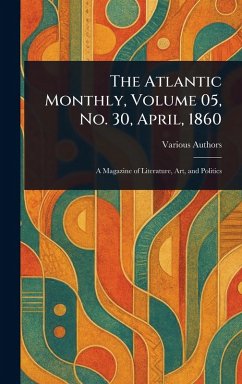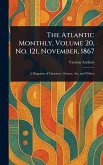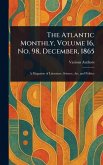Step back in time with "Atlantic Monthly, Vol. 5, No. 30, April, 1860," a captivating glimpse into the heart of 19th-century American literature and thought. This meticulously reproduced volume of the esteemed periodical offers a rich tapestry of essays, short stories, and poetry, reflecting the cultural and intellectual landscape of a nation on the cusp of profound change. Explore a diverse collection of voices and perspectives, capturing the spirit of a pivotal era in American history. As a significant example of American periodicals, this edition of the "Atlantic Monthly" provides invaluable insights into the literary trends, social concerns, and political debates that shaped the nation. Delve into works that resonated with readers over a century ago, offering a unique window into the past. Discover timeless themes and enduring artistry within these pages, making this volume a treasure for students of American literature, history buffs, and anyone seeking a deeper understanding of the American experience. A valuable addition to any collection of American literary history. This work has been selected by scholars as being culturally important, and is part of the knowledge base of civilization as we know it. This work is in the public domain in the United States of America, and possibly other nations. Within the United States, you may freely copy and distribute this work, as no entity (individual or corporate) has a copyright on the body of the work. Scholars believe, and we concur, that this work is important enough to be preserved, reproduced, and made generally available to the public. We appreciate your support of the preservation process, and thank you for being an important part of keeping this knowledge alive and relevant.
Bitte wählen Sie Ihr Anliegen aus.
Rechnungen
Retourenschein anfordern
Bestellstatus
Storno









